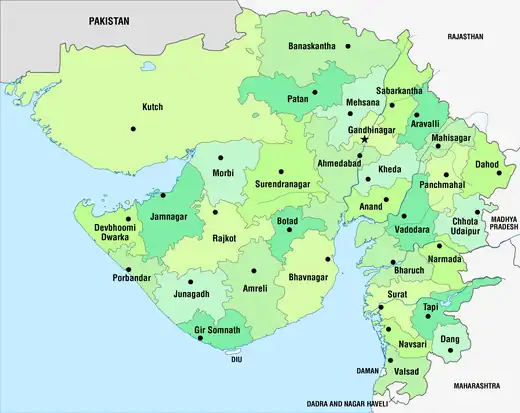Kheda district
Charotar | |
|---|---|
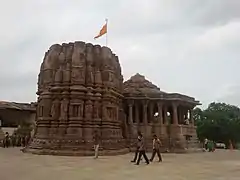 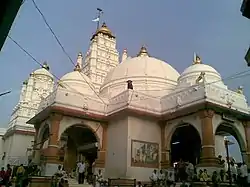 .jpg.webp)  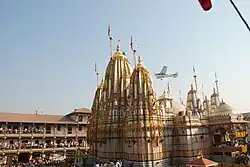 Clockwise from top-left: Galteshwar Mahadev Temple, Ranchhodji Temple, Dakor, Elim Church, Nadiad, Swaminarayan Temple, Vadtal, Vatrak River at Sarsavani | |
.svg.png.webp) Location of district in Gujarat | |
| Coordinates: 22°45′N 72°41′E / 22.750°N 72.683°E | |
| Country | |
| State | Gujarat |
| Headquarters | Kheda |
| Population (2011) | |
| • Total | 2,053,769 |
| Languages | |
| • Official | Gujarati, Hindi |
| Time zone | UTC+5:30 (IST) |
| Vehicle registration | GJ-07 |
| Website | kheda |
Kheda District is one of the thirty-three districts of Gujarat state in western India. It is part of the region known as Charotar, consisting of Kheda and Anand districts.. Its central city Nadiad is the administrative headquarters of the district.
History
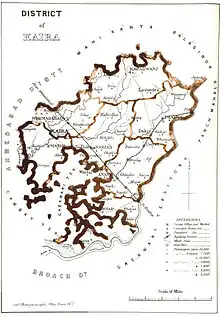
Formerly known as Kaira district, it was divided in two with the southern part becoming Anand district in 1997.[1] The Charotar region of Kaira consisted of four talukas (sub-districts): Nadiad, Anand, Borsad, and Petlad.[2] When the district was divided, Nadiad Taluka went with Kheda district and the other three with Anand district.[3] Today, Kheda has eleven talukas.[4] Balasinor and Virpur, once in Kheda district, were moved to the newly formed Mahisagar district in 2013.[5]
During the Indian independence movement in the first half of the 20th century, the Patidars of the Charotar region and other areas in Kaira resisted the British in a number of standoffs, notably the Kaira anti-tax campaign of 1913, the Kheda Satyagraha of 1918, the Borsad Satyagraha of 1923,[6] and the Bardoli Satyagraha of 1928.[7]
Demographics
| Year | Pop. | ±% p.a. |
|---|---|---|
| 1901 | 524,392 | — |
| 1911 | 514,019 | −0.20% |
| 1921 | 522,318 | +0.16% |
| 1931 | 568,276 | +0.85% |
| 1941 | 676,215 | +1.75% |
| 1951 | 816,050 | +1.90% |
| 1961 | 1,018,911 | +2.24% |
| 1971 | 1,277,630 | +2.29% |
| 1981 | 1,566,361 | +2.06% |
| 1991 | 1,798,282 | +1.39% |
| 2001 | 2,037,894 | +1.26% |
| 2011 | 2,299,885 | +1.22% |
| source:[8] | ||
According to the 2011 census Kheda district has a population of 2,299,885,[9] roughly equal to the nation of Latvia[10] or the US state of New Mexico.[11] This gives it a ranking of 197th in India (out of a total of 640).[9] The district has a population density of 541 inhabitants per square kilometre (1,400/sq mi) .[9] Its population growth rate over the decade 2001-2011 was 12.81%.[9] Kheda has a sex ratio of 937 females for every 1000 males, and a literacy rate of 84.31%.[9]
The divided district had a population of 2,053,769, of which 474,041 (23.08%) lived in urban areas. The divided district had a sex ratio of 940 females per 1000 males. Scheduled Castes and Scheduled Tribes made up 98,686 (4.81%) and 37,310 (1.82%) of the population respectively.[9]
Hindus are 1,780,801, while Muslims are 239,214 and Christians are 26,387.[12]
Language
At the time of the 2011 census, 97.14% of the population spoke Gujarati and 2.01% Hindi as their first language.[13]
Administrative divisions
Since 2013, Kheda district has been divided into eleven taluka.[4]
- Nadiad (city)
- Thasra (code 03878), city of Dakor, villages include Kalsar,
- Kapadvanj, villages include Abvel, Antroli, Ghadiya, Telnar
- Mehmedabad (Mahemdavad), headquartered in the town of Mahemdavad, villages include Haldarvas, Kanij, Sarsavani
- Kathlal, villages include Anara, Bajakapura
- Matar, headquartered in Matar village, villages include Asamali
- Mahudha, headquartered in the municipality of Mahisa, Mahudha, villages include Heranj
- Kheda, villages include Dedarda, Vavdi
- Nadiad (rural), villages include Davda
- Galteshwar (271.28 km2 [104.74 sq mi], villages include Anghadi, Kuni, Pali
- Vaso, headquartered in Vaso, villages include Palana, Rampur (Rampura)
Politics
| District | No. | Constituency | Name | Party | Remarks | |
|---|---|---|---|---|---|---|
| Kheda | 115 | Matar | Kalpeshbhai Parmar | Bharatiya Janata Party | ||
| 116 | Nadiad | Pankajbhai Desai | Bharatiya Janata Party | |||
| 117 | Mehmedabad | Arjunsinh Chauhan | Bharatiya Janata Party | |||
| 118 | Mahudha | Sanjaysinh Mahida | Bharatiya Janata Party | |||
| 119 | Thasra | Yogendrasinh Parmar | Bharatiya Janata Party | |||
| 120 | Kapadvanj | Rajeshkumar Zala | Bharatiya Janata Party | |||
| 121 | Balasinor | Mansinh Chauhan | Bharatiya Janata Party | |||
Notable people
- Govardhanram Tripathi (1855–1907) Writer; born in Nadiad.
- Manilal Nabhubhai (1858–1898) Writer and philosopher; born in Nadiad.
- Ravji Patel (1939–1968) Modernist poet and novelist; born in Vallavpura village.
- Sardar Vallabhbhai Patel (1875 – 1950) Indian freedom fighter and first Home minister of India; born in Nadiad[14]
- Indulal Yagnik (1892-1972) Indian independence activist, leader of the All India Kisan Sabha, and the most influential leader of the Mahagujarat movement
See also
References
- ↑ "History of Anand District". Gujarat Government. Archived from the original on 10 February 2015.
- ↑ Heredia, Ruth (1997). The Amul India Story. New Delhi: McGraw-Hill. p. 8. ISBN 978-0-07-463160-7.
- ↑ "Gujarat Administrative Divisions 2011" (PDF). Office of The Registrar General & Census Commissioner, Ministry of Home Affairs, Government of India. Archived (PDF) from the original on 26 October 2011.
- 1 2 "Taluka | District Kheda, Government of Gujarat | India".
- ↑ "Seven new districts as Gujarat's I-Day gift". Daily News and Analysis (DNA). 14 August 2013. Archived from the original on 19 August 2013.
- ↑ Satyagraha means the nonviolent resistance popularised by Gandhi. Gandhi, Mahatma K. (1951). Non-Violent Resistance (Satyagraha). New York: Schocken. p. 189–190. OCLC 606004619.
- ↑ Heredia 1997, p. 10
- ↑ Decadal Variation In Population Since 1901
- 1 2 3 4 5 6 "District Census Hand Book – Kheda" (PDF). Census of India. Registrar General and Census Commissioner of India.
- ↑ US Directorate of Intelligence. "Country Comparison:Population". Archived from the original on 13 June 2007. Retrieved 1 October 2011.
Latvia 2,204,708 July 2011 est.
- ↑ "2010 Resident Population Data". U. S. Census Bureau. Archived from the original on 19 October 2013. Retrieved 30 September 2011.
New Mexico - 2,059,179
- 1 2 "Population by Religion - Gujarat". censusindia.gov.in. Registrar General and Census Commissioner of India. 2011.
- 1 2 "Table C-16 Population by Mother Tongue: Gujarat". censusindia.gov.in. Registrar General and Census Commissioner of India.
- ↑ Joshi, S. (1969). "Life against Death: The Poetry of Ravji Patel". Books Abroad. 43 (4): 499–503. doi:10.2307/40123774. JSTOR 40123774.
External links
- Official site
- Glorious India website.
 Geographic data related to Kheda district at OpenStreetMap
Geographic data related to Kheda district at OpenStreetMap
